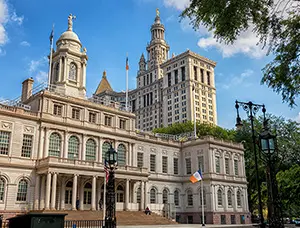Government Procurement And Contracts

Among the types of matters, involving government procurement and contracts, in which we represent or advise vendors are the following:
- Vendor pre-qualification
- Responses to government solicitations
- Disclosures to the government
- Inquiries into vendor responsibility (integrity), and appeals of determinations of non-responsibility
- Appeals of non-responsiveness findings
- Protests by unsuccessful bidders
- Contract negotiations
- Compliance with federal, state, and municipal government affirmative action obligations
- Prevailing wage and living wage requirements
- Ethics and conflicts of interest
- Government investigations of contractors
- Debarment proceedings
- Litigation arising from all of the above
New York City’s Procurement Activity
New York City’s (including Manhattan)’s procurement mechanisms are intended to meet the goals of obtaining the best possible work at the lowest possible price through a fair process.
The sheer size and scope of New York City’s procurement system is immense. For example, in fiscal year 2022, New York City agencies completed nearly 135,000 procurements with a total value of nearly $38 billion.
While representing only 1% of the total contract value, 68 percent of New York City’s procurements were worth $100,000 or less and were made using the small purchase method of procurement. Approximately 42,000 to 43,000 procurement actions are taken each year that are not such small purposes.
A public procurement system’s primary and essential function is to obtain supplies and services necessary to accomplish an agency’s mission. New York City spends approximately 25% of its annual budget purchasing goods, services, and construction. In fiscal year 2022, for example, New York City agencies completed procurements with a total value of nearly $39 billion. Of that total:
- 53 percent of the procurements were of human services
- 8 percent were of standardized services
- 13 percent were of construction services
- 2 percent were of architecture/engineering services
- 15 percent were of other professional services
- 9 percent were of goods
Within these categories, New York City (including Manhattan) supports a wide range of activities, including everything from social services such as homeless shelters, senior centers, and job training, to basic infrastructure such as maintaining, repairing, and replacing streets, bridges, and water mains, to services such as a computer-aided dispatch system required for agencies to provide essential services such as responding to 911 calls.
How New York City’s Procurement Process Is Structured
Under the New York State General Municipal Law, all municipalities must award all contracts for “public work” over specified minimum amounts through a competitive sealed bid process to the lowest responsible bidder. The General Municipal Law also provides that public works contracts may be awarded after public advertisement or through a pre-qualified list.
In conducting a competitive sealed bid, New York City is subject to specific procedural requirements outlined in the General Municipal Law, the New York City Charter, the New York City Administrative Code, and the New York City Procurement Policy Board Rules. Four of these elements are (1) advertising pre-qualification, (2) responsiveness, (3) responsibility; and (4) lowest bidder / best value.
Lowest Bidder/Best Value. In a competitive sealed bid for public work, the contract must be awarded to the responsible and responsive bidder with the lowest price.
Responsibility. New York City may award contracts only to responsible bidders. The City maintains information regarding a potential contractor’s responsibility in New York Procurement and Sourcing Solutions Portal (“PASSPort”), formerly known as VENDEX.
PASSPort is New York City’s end-to-end digital procurement platform. PASSPort contains, among other things, a repository of information about how a contractor has performed on past public contracts and issues related to the contractor’s business integrity and principles.
The system essentially allows New York City agencies to share information about businesses seeking to do business with the City.
Before a bidder may be awarded a contract, the New York City agency checks PASSPort for relevant information. The bidder’s previous history with the City, such as adverse performance evaluations or significant breaches of previous contracts, and information obtained from external bodies regarding performance or integrity issues, are all entered onto PASSPort.
In addition, the bidder must complete a series of forms called PASSPort questionnaires requesting information about the bidder, its principals and affiliates, and its past practices. This information includes items such as the contractor’s address, tax certification number, other names under which the contractor has conducted business in the past five years, the names of affiliates, contract sanctioned history, whether taxes have been paid in the previous five years, and similar information.
This information is used for making a responsibility determination on the specific contract. In addition, this information is entered into VENDEX for consideration by New York City agencies for future contract awards.
If you are a contractor or a vendor who needs representation in preparing bids and proposals to agencies, authorities, or development corporations in New York City, or in resolving disputes that have arisen during the bidding process or after the contract has been awarded, contact the Law Offices of David S. Rich, LLC.

